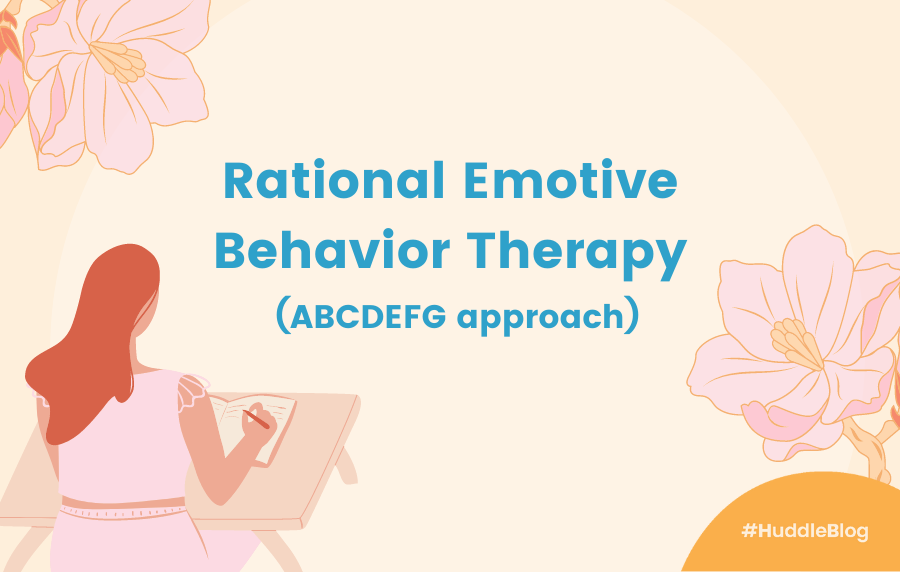Dr Albert Ellis developed this style of therapy in 1954 through influences from the works of major philosophers such as Epictetus, Epicurus, Marcus Aurelius, Lau Tzu, Confucius and Gautama Buddha. A quote by Epictetus heavily inspired the framework used in this style of therapy.
“People are not disturbed by the events that happen to them but by their view of these events.”
REBT takes a humanistic-existential approach to human problems by offering tools to establish the creation of a world where a person can place him or herself first. “Rational” in REBT hinges on the goal-directed nature of human beings. It helps people achieve their goals and purposes through these theoretical concepts. The distinction lies between our rational and irrational Beliefs. When we are rational, we exude efficient behaviour, we are happy and competent. In an irrational state, we are described as inefficient, unhappy and incompetent. Our emotions and behaviours are not experienced in isolation but overlap with our cognitive ability to a significant degree. Most human beings are born irrational but we learn to adopt rational behaviours through the environment we are exposed to.
REBT offers a practical approach to overcoming adversities and achieving our goals through a variety of methods employed to reframe dysfunctional beliefs into more sensible, realistic and helpful ones.
The ABCEFGs –
(A) Adversity or Activating event: What is the trigger? What is the critical element within this event that I am reacting to?
Inference – I made a mistake at work.
(B) Belief: What you tell yourself when encountering this adversity. Is it rational or irrational?
Inference – I feel like a failure. I am not good at anything.
(C) Consequence: Rational belief leads to healthy consequences. Irrational belief leads to unhealthy consequences.
Inference – Having such beliefs make me feel less and lousy. I am unlovable. I feel disappointed and sad.
(D) Disputation: Dispute the irrational belief into a rational one by questioning the cognitive distortion.
Inference – Everyone makes mistakes. Making mistakes does not make me worthless.
(E) New Effect: Healthy consequences after having a rational belief.
Inference – I have the power to reframe my thoughts and reinforce positive ones.
(F) New Function: New behaviour that is consistent with the new effect.
Inference – Commits to learning that making mistakes is only natural and that it helps me grow. Be more attentive and keep doing my best.
(G) – Goal: Setting goals i.e to build better habits
Inference – Striving to improve my relationship with others.
We are often inclined to conclude that (A) is the direct reason for the consequence that we experience. This assumption leads us to project our frustrations towards the activating event without considering our beliefs. On top of that, we create additional pressure by having conditional terms in our goal setting where happiness is dependent on the achievement of our desires. But this type of attitude produces irrational outcomes that are still classified under the realm of irrational behaviours. The result is the achievement of your goals with a short-lived feeling of happiness, but you live with the anxiety of losing it one day or you crumble at the thought of failure when the outcome is unsuccessful. Studies researched by a clinical psychologist, Helen Street suggests that conditional goal-setters conceptualise happiness and well-being as abstract goals. These individuals associate their well-being with the achievement of a single concrete goal, therefore inducing unnecessary pressure around the pursuit of the goal. It creates a mindset that happiness has to be put on hold during the process of goal pursuit.
The teachings of Gautama Buddha upon gaining enlightenment perfectly describe the nature of desires and goal pursuit.
“Desires do not need to be fulfilled. Desires are not the same as needs.” Perhaps there is an evolutionary advantage to having binary conditions for our attainment of goals. It helps us think on our feet when we encounter a predator during a hunt. Conditional goal attainment is applicable in pre-modern times but it serves us better in current times to adopt unconditional goal setting. The key is to change our beliefs.
Conditional goal setting sounds like:
“I absolutely need to get this job. If not, I am a failure.”
Unconditional goal setting sounds like:
“I would like to get this job but I don’t need to. If I don’t, it is merely a mild inconvenience.”
Your beliefs (B) about the adversity (A) has strong influences on your cognitive, emotional and behavioural consequences (C). The strong correlation between your beliefs and the adversity leads you to experience the kind of outcome that you have imagined.
A, B and C are closely related and they don’t tend to exist without the other. By watching your thoughts and disputing your beliefs, you can change the cognitive response towards adversity and create new healthy consequences. The above framework guides us through our cognitive processing via constructive disputation as a method for self-therapy.
You have the power to take charge of your own life and introspect on where your internal narratives can be changed. Inject patience into the process of self-reflection so you can implement functional and healthy attitudes towards your goals and in life.





